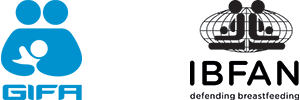
2024/02/06
Switzerland has signed the Convention on the Rights of the Child in 1991 and ratified in 1997. The Convention is legally binding on Switzerland.
- Breastfeeding – a Child Rights issue?
- The situation of breastfeeding in Switzerland
- Switerland’s reports to the CRC Committee
- The 2015 IBFAN report to the Committee on the Rights of the Child
- 2013: IBFAN-GIFA contributed to the Report of the Network of Swiss NGOs for the rights of the child (Fr.) about children’s rights in Switzerland
The UN Convention on the Rights of the Child (CRC) emphasises the State’s responsibility to protect minors (up to the age of 18) and ensure their welfare. The Committee on the Rights of the Child monitors compliance with the Convention. Due to the wide range of issues covered by the UN Convention on the Rights of the Child and Switzerland’s federalist system, implementation of the Convention is the responsibility of a multitude of state bodies. Details on Swiss Government page here
Breastfeeding – a Child Rights issue?
Article 24 of the Convention states that the child has the right “to the enjoyment of the highest attainable standard of health”. this implies breastfeeding. This expression is repeated in General Comment No. 15 of 2013 et concerns also the General Comment N°16. For details please refer to our webpage The Convention of the Rights of the Child.
The situation of breastfeeding in Switzerland
According to the 3rd Swiss Infant Feeding Study 2014 (SWIFS 2014 (Fr) after 1994 and 2003), the prevalence of breastfeeding had increased significantly between 1994 and 2003 in Switzerland; however, rates have remained almost unchanged since 2003. The rate of early initiation of breastfeeding is 95%, the median duration of exclusive breastfeeding is 17.4 weeks, and the average total duration of breastfeeding is 31 weeks (i.e. 50% of mothers no longer breastfeed at all at 31 weeks).
Despite appearances, Switzerland does not offer a very favourable context for breastfeeding, with very limited application of the International Code and inadequate framework conditions – training for the health professions on the subject of breastfeeding, comprehensive and impartial information for parents. See our webpage here
Switerland’s reports to the CRC Committee
State report of 2020
Switzerland submitted its 5th and 6th reports to the Committee on the Rights of the Child on 18 December 2020. We reproduce below the paragraphs concerning breastfeeding 5e-et-6e-rapports-de-la-Suisse-sur-la-Convention-ONU-relative-aux-droits-de-lenfant
Breastfeeding
Response to §22a
- The Swiss Nutrition Strategy has issued recommendations for pregnancy and the breastfeeding period, as well as for infants and young children. Awareness-raising among parents and carers is underway with the support and collaboration of health NGOs, cantons and professionals.
- Since breastfeeding offers considerable advantages in terms of dietary hygiene, immune resistance and the mother-child bond, all necessary measures must be taken to enable workers to breastfeed, even after maternity leave. They must be given the time they need to breastfeed (art.35a LTr), a suitable place to do so within the company (art.34 OLT 3) and remuneration for the time spent breastfeeding (art.60 OLT 1).
Response to §22b
- “Promotion allaitement maternel Suisse” (Promotion of breastfeeding in Switzerland), an independent national competence centre supported financially by the Confederation, serves as an information platform for parents and works to promote optimum legal and social conditions for breastfeeding.
- Under the ODAlOUs, restrictions on the advertising of infant formula are now binding on manufacturers and the trade; the cantonal authorities must monitor compliance with the restrictions.
2015 Concluding observations by the CRC addressed to Switzerland
In January 2015, IBFAN-GIFA presented an alternative report on the situation of breastfeeding and infant and young child feeding in the country.
In February 2015, the Committee on the Rights of the Child (CRC) sent its CRC Concluding Observations to Switzerland Concluding Observations to Switzerland (19 pages). Ms Maury Paquier made a Parliamentary Interpellation in 2018 (18.4082) to find out the Federal Council’s position on the responses to these CRC observations, see the Swiss Parliamentary Report.
In 2019, lhe report of the Federal Office of social insurance OFAS publishes its position in relation to the Committee fo the Rights of the Child (19 December 2018) Mesures pour combler les lacunes CRC
*** take up here again
The 2015 IBFAN report to the Committee on the Rights of the Child
This alternative report of 2015 highlights the lack of a coherent strategy for the protection, promotion and support of infant and young child feeding at the national level, as well as the lack of political will, planning and resources to create a conducive environment for breastfeeding and thus enable parents to make the right decisions regarding their child’s feeding based on correct and neutral information.
Besides, the level of protection of breastfeeding against commercial pressures is not enough: Swiss law does not cover all the measures of the International Code (Fr.) and only applies to formulas for infants under 6 months of age; moreover, the monitoring of this legislation is not carried out independently, since the panel responsible for monitoring is composed equally of experts and representatives of the baby food industry. As a result, mothers of 4-month-old infants often receive samples of follow-on milk and complementary foods.
Finally, the lack of breastfeeding training for health professionals organized independently of the infant food industry is a concern. This often results in poor information provided by caregivers to parents, who often find themselves in situations of conflict of interest caused by the close financial links between their professional associations and the baby food industry.
2013: IBFAN-GIFA contributed to the Report of the Network of Swiss NGOs for the rights of the child (Fr.) about children’s rights in Switzerland
Switzerland is not a good performer in terms of protection, promotion and support for breastfeeding and child feeding:
Excerpt from the 2013 NGO report on breastfeeding:
(…) The government report indicates a slight increase in breastfeeding rates (N 249). However, Switzerland is still far from meeting WHO recommendations for full and exclusive breastfeeding until six months of age and continued breastfeeding in parallel with the introduction of solid foods. Switzerland has not put in place a national strategy or provided the necessary resources in terms of finance and personnel to promote breastfeeding and healthy infant and young child feeding. On the other hand, an example is the project of the Health Directorate of the Canton of Geneva entitled Marchez et Mangez Malin ! (“Walk and Eat Smart”), which provides specific measures to encourage breastfeeding. In addition, there are too few independent training and awareness opportunities for professionals (doctors, pharmacists). The International Code on the Marketing of Breastmilk Substitutes and the final resolutions of the World Health Assembly are insufficiently anchored in Swiss law. The manufacturers’ code of conduct for the marketing of breastmilk substitutes in Switzerland applies only to initial milk for infants up to six months of age and not to first solid foods, other breastmilk substitutes, bottles and pacifiers (…)
Excerpt from the report on parental leave to care for sick children:
(…) Working parents whose children are ill are not entitled, by law, to appropriate paid leave to care for their children. Some employers graciously allow parents’ unpaid or paid absence when their children need them. It should be noted that Switzerland has in the meantime slightly improved maternity protection by introducing maternity allowance and ratifying ILO Convention No. 183.
Mothers are entitled to 14 weeks of paid maternity leave and after resuming their activity, the right to paid breastfeeding breaks during their working hours. Overall, however, the framework conditions remain below the recognised standards for maternity protection and care of sick children. (…)
Photo : http://col71-condorcet.ac-dijon.fr/spip.php?article360
